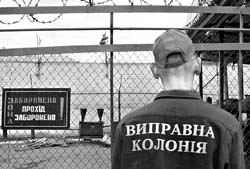An alternative to prison camps
What is restorative justice?
In 2007-08, the civic organization Ukrainian Center for Reconciliation and its partners, consisting of local courts, social services, and schools, will implement a project to establish a network of restorative justice centers in Ukraine. Restorative justice is an entirely new practice in our judicial system, although Ukraine has been introducing it gradually over the past several years. The victim and the offender meet in the presence of a law-enforcement officer well before the case goes to a criminal or administrative court, and settle the conflict in a way that will keep the offender from going to jail.
Supreme Court Justice Tetiana Shevchenko recalled a case in which a drive ignored traffic regulations and hit another car, killing several people. Immediately after the accident, he paid for medical treatment of all the injured passengers, paid compensation for material damages, and promised to take care of the children whose parent had been killed. As a result, the judges handed down a suspended sentence.
“This is the exception rather than the rule, but it still shows that each case should be assessed differently,” Shevchenko emphasized. “In general, the Ukrainian judicial system already has ample grounds to apply restorative justice. Articles 45 and 46 of the Criminal Code call for waiving liability if the offender compensates for the victim’s losses and shows remorse, and the two sides make peace. As a rule, this practice is applied to minor offenses, although we would like it to cover medium- gravity crimes too.”
Experts emphasize that those who could most benefit from restorative justice are juvenile delinquents, who can get the chance to correct their behavior because a prison camp is not the place where they will learn anything good. According to parliamentarian Kateryna Levchenko, the director of the La Strada international organization, thefts account for half of the 13,000 crimes committed by juveniles last year. For many of these teenagers this was their first offense. If the situation is handled in a humane way — by determining whether their crime was motivated by lack of food or clothing — these youngsters will not go to prison, where their lives will be scarred.
Nadia Prokopenko, a social worker at the Ukrainian Center for Reconciliation, has been practicing in this field for two years. She is a victim-offender mediator and deals with cases from Kyiv’s Darnytsia Raion Court with which her center cooperates. “Naturally, it is the offender who should show reconciliation initiative,” she told The Day.
“In one case that I handled, some boys aged 21 and 17 broke into a woman’s apartment and stole electronic appliances, money, and other things. They were quickly found, a case was opened against them, and they gave a written pledge that they would stay in the city. Then they came to us. First, I talked with the victim and then with the boys. Then all three met in my presence. It was very difficult for all of them to talk and simply look at each other, but everyone, especially the victim, had a good chance to speak out.
“When offenders go to commit a crime, they only think about themselves, but during a mediation session they see the way the victim has suffered. As a rule, after the first wave of emotions ebbs, people switch to the practical side of the matter, i.e., making up for material losses. I think the most important thing in this case was that the female victim said, ‘Even if they don’t give me any compensation, I will still feel better.”
After the mediation the two parties sign a reconciliation agreement that goes to the judge, who takes it into account during sentencing. In this case, the boys were lucky and got off with a suspended sentence.
The Ukrainian Center for Reconciliation knows of only 100 cases of restorative justice in Ukraine. Today there are restorative justice centers in Kyiv, Bila Tserkva, Ivano-Frankivsk, and Odesa, and a few more are in the pipeline. This is a very pressing problem because, according to Viktor Lobach, deputy chief of the Main Department of the Prosecutor-General’s Office of Ukraine and head of the public prosecutions department, juvenile delinquency is on the rise in Ukraine. The number of thefts alone has increased fivefold and many offenses are not reported at all.
“Restorative justice is by far the most important aspect of the judicial system. This may be applied to children even to a greater extent than to adults because youngsters can be expected to show sincere remorse and admit their guilt when they are facing imprisonment. In a way, this will be a lifelong reminder for them,” Lobach says.
Restorative justice is being introduced in Ukraine under the auspices of the Supreme Court of Ukraine, the Judicial Academy, the Ministry of Justice, the Ministry for the Family, Youth, and Sport, the Prosecutor-General’s Office, the State Department for Penitentiaries, and other government organizations.






